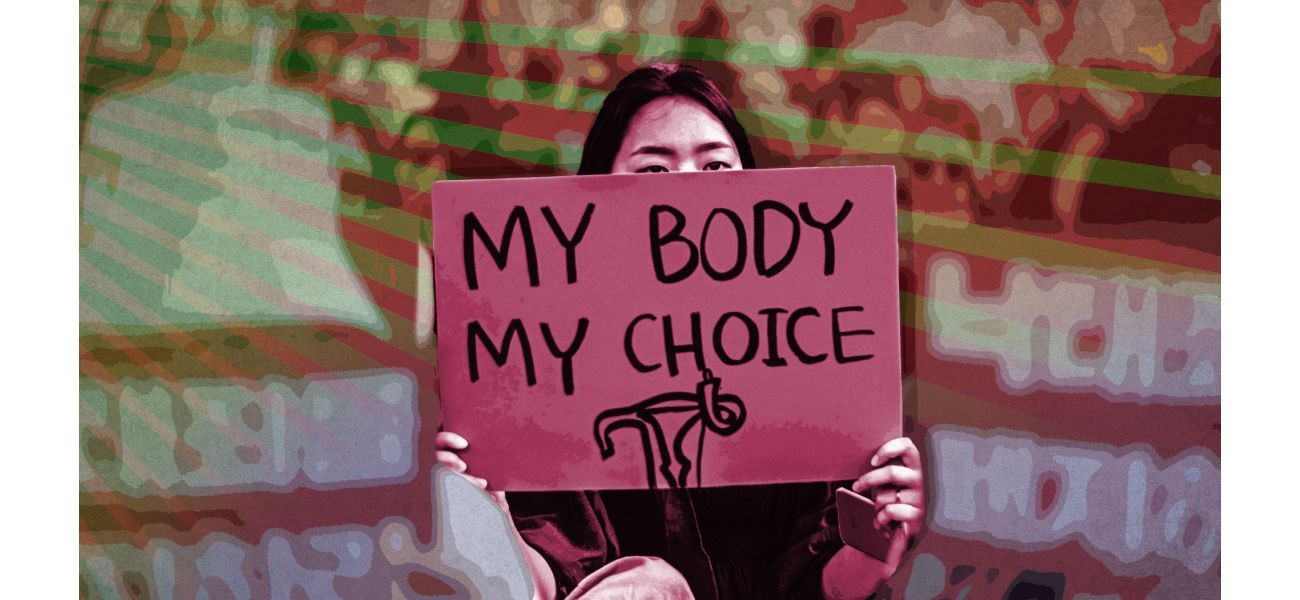A group of women known as 'femcels' are advocating for women to permanently reject men.
South Korea's 4B movement has four rules, including a ban on sex.
November 8th 2024.

The 4B movement, a form of protest against the gender inequality and violence faced by women, has been gaining momentum in South Korea. Yeowon, a 26-year-old office worker, is one of the many Korean women who have taken a vow to avoid all relationships with men. This includes refraining from heterosexual marriage and dating, as they believe it eliminates the risks that come with these relationships.
Inspired by the movement, American women have also started their own version of the 4B crusade after Donald Trump's political comeback and his win in the 2024 US election. However, the 4B movement is more than just withholding sex as a statement. It is a lifestyle choice that stems from generations of inequality and violence faced by women, and many women have committed to it for the long haul.
But what exactly is the 4B movement? It is also known as 'four nos' or 'four bi-' in Korean, referring to four words that all start with 'bi-' which translates to 'no' in English. These four tenets include no sex with men, no giving birth, no dating men, and no marriage with men. It emerged online around 2015, as women formed digital communities in the wake of South Korea's MeToo and Escape the Corset movements.
Dr Euisol Jeong, a feminist scholar, explains that the movement started with women sharing their negative experiences in romantic relationships and evolved into a critique of toxic masculinity. It also offers advice on how to avoid problematic partners. As a result, slogans such as 'bihon' and 'bichulsan' were coined, and boycotting Korean men as romantic partners became a common practice.
However, the issues of gender inequality and discrimination against women in South Korea have been apparent for much longer than a decade. Heejung Chung, a Korean professor at King's College London, who has studied gender inequality, shares that Korea is one of the most conservative countries when it comes to women's rights and their position in the labour market.
According to The Economist's Glass Ceiling Index, South Korea ranks as the worst country for women in the workforce. And while attitudes are slowly changing, a 2019 survey found that 60% of Korean men under 30 do not believe that discrimination against women is a serious issue. This perception is largely influenced by Confucian thought, where women are expected to belong to their fathers until they get married and then become subservient to their husbands.
These traditional beliefs are still prevalent in Korean society, with recent guidelines suggesting that pregnant women should prepare a week's worth of undergarments for their husbands while they are in the hospital giving birth. It also encourages women to lose weight by performing household chores. These expectations, along with academic achievements and conforming to strict beauty standards, have put immense pressure on women in Korea.
Heejung, who is Korean but has lived in the US and the UK, shares that she felt 'priced out' of the marriage market in Korea because men wanted to marry someone of lower status. She eventually chose to move to Europe and is now happily married to a 'feminist' German man. She believes that the obligations placed on women in Korean society, as a daughter, daughter-in-law, and mother, would have restricted her from achieving many things that she has been able to do in Europe.
Frustrated with the steep expectations and misogynistic views, women in South Korea have started protesting against inequality en masse. Some have decided to hit men where it hurts the most - the bedroom. Some advocates of the 4B movement engage in relationships only with women, while others choose to stay single. Efforts to break away from the patriarchal paradigm, such as challenging beauty norms, are also encouraged.
Jiny Kim, a 30-year-old office worker from Seoul, shared with the New York Times that she and many others have sworn off marriage and motherhood as a way to take revenge on a society that places impossible burdens on them and does not respect them. While it was reported that 4,000 women were part of the 4B movement in 2019, the exact number of advocates is hard to determine as many choose to remain anonymous. Some also refer to themselves as 'bihon' or abstain from marriage and childbirth but are not affiliated with a specific group.
Dr Jeong adds that the 4B movement is largely individualistic, making it challenging to measure the exact number of advocates or classify it as a mainstream political agenda. She also explains that openly expressing feminist views in South Korea is still taboo and carries the risk of losing one's job or facing physical violence. Despite the challenges, the movement continues to gain support and attention, with hashtags and social media posts advocating for women's rights and gender equality.
The 4B movement in South Korea has sparked both support and backlash. While many women feel empowered by the movement and its message, others criticize it as extreme and divisive. Some men have also expressed anger and resentment towards the movement, feeling unfairly targeted.
At the same time, the 4B movement has brought much-needed attention to the issues of gender inequality and misogyny in South Korea. It has sparked important conversations and debates about women's rights and the need for societal change.
The movement has also gained international attention, with women in other countries, such as the United States, looking to emulate it in their own way as a form of protest against oppressive systems and leaders.
Overall, the 4B movement is a powerful statement against gender-based discrimination and violence. It shows that women are coming together to stand up for their rights and demand change. While it may be seen as controversial by some, it is an important and necessary step towards creating a more equal and just society.
Inspired by the movement, American women have also started their own version of the 4B crusade after Donald Trump's political comeback and his win in the 2024 US election. However, the 4B movement is more than just withholding sex as a statement. It is a lifestyle choice that stems from generations of inequality and violence faced by women, and many women have committed to it for the long haul.
But what exactly is the 4B movement? It is also known as 'four nos' or 'four bi-' in Korean, referring to four words that all start with 'bi-' which translates to 'no' in English. These four tenets include no sex with men, no giving birth, no dating men, and no marriage with men. It emerged online around 2015, as women formed digital communities in the wake of South Korea's MeToo and Escape the Corset movements.
Dr Euisol Jeong, a feminist scholar, explains that the movement started with women sharing their negative experiences in romantic relationships and evolved into a critique of toxic masculinity. It also offers advice on how to avoid problematic partners. As a result, slogans such as 'bihon' and 'bichulsan' were coined, and boycotting Korean men as romantic partners became a common practice.
However, the issues of gender inequality and discrimination against women in South Korea have been apparent for much longer than a decade. Heejung Chung, a Korean professor at King's College London, who has studied gender inequality, shares that Korea is one of the most conservative countries when it comes to women's rights and their position in the labour market.
According to The Economist's Glass Ceiling Index, South Korea ranks as the worst country for women in the workforce. And while attitudes are slowly changing, a 2019 survey found that 60% of Korean men under 30 do not believe that discrimination against women is a serious issue. This perception is largely influenced by Confucian thought, where women are expected to belong to their fathers until they get married and then become subservient to their husbands.
These traditional beliefs are still prevalent in Korean society, with recent guidelines suggesting that pregnant women should prepare a week's worth of undergarments for their husbands while they are in the hospital giving birth. It also encourages women to lose weight by performing household chores. These expectations, along with academic achievements and conforming to strict beauty standards, have put immense pressure on women in Korea.
Heejung, who is Korean but has lived in the US and the UK, shares that she felt 'priced out' of the marriage market in Korea because men wanted to marry someone of lower status. She eventually chose to move to Europe and is now happily married to a 'feminist' German man. She believes that the obligations placed on women in Korean society, as a daughter, daughter-in-law, and mother, would have restricted her from achieving many things that she has been able to do in Europe.
Frustrated with the steep expectations and misogynistic views, women in South Korea have started protesting against inequality en masse. Some have decided to hit men where it hurts the most - the bedroom. Some advocates of the 4B movement engage in relationships only with women, while others choose to stay single. Efforts to break away from the patriarchal paradigm, such as challenging beauty norms, are also encouraged.
Jiny Kim, a 30-year-old office worker from Seoul, shared with the New York Times that she and many others have sworn off marriage and motherhood as a way to take revenge on a society that places impossible burdens on them and does not respect them. While it was reported that 4,000 women were part of the 4B movement in 2019, the exact number of advocates is hard to determine as many choose to remain anonymous. Some also refer to themselves as 'bihon' or abstain from marriage and childbirth but are not affiliated with a specific group.
Dr Jeong adds that the 4B movement is largely individualistic, making it challenging to measure the exact number of advocates or classify it as a mainstream political agenda. She also explains that openly expressing feminist views in South Korea is still taboo and carries the risk of losing one's job or facing physical violence. Despite the challenges, the movement continues to gain support and attention, with hashtags and social media posts advocating for women's rights and gender equality.
The 4B movement in South Korea has sparked both support and backlash. While many women feel empowered by the movement and its message, others criticize it as extreme and divisive. Some men have also expressed anger and resentment towards the movement, feeling unfairly targeted.
At the same time, the 4B movement has brought much-needed attention to the issues of gender inequality and misogyny in South Korea. It has sparked important conversations and debates about women's rights and the need for societal change.
The movement has also gained international attention, with women in other countries, such as the United States, looking to emulate it in their own way as a form of protest against oppressive systems and leaders.
Overall, the 4B movement is a powerful statement against gender-based discrimination and violence. It shows that women are coming together to stand up for their rights and demand change. While it may be seen as controversial by some, it is an important and necessary step towards creating a more equal and just society.
[This article has been trending online recently and has been generated with AI. Your feed is customized.]
[Generative AI is experimental.]
0
0
Submit Comment





